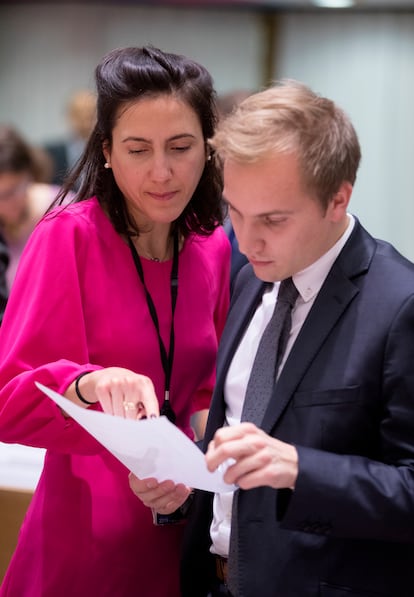Valérie Hayer, the daughter of farmers who will lead Europe’s liberals amid turbulent times for the countryside
The French member of the European Parliament has been elected president of Renew, the centrist bloc most threatened by the rise of the extreme right before the June elections

On January 25, Valérie Hayer became the youngest-ever leader of the Reform Europe bloc, the centrist liberal political group in the European Parliament. Her elevation to the post — just a few months before the EU-wide elections — has boosted her image slightly, although she remains a largely unknown figure even in her native France.
Amid the current circumstances — with Brussels threatened by angry farmers, who are protesting over precarious living conditions that they blame largely on EU regulations — perhaps Hayer’s best asset is her family pedigree as the “daughter, sister-in-law, sister and granddaughter of farmers,” as she constantly presents herself.
“We’re very attentive to the situation of farmers throughout Europe,” she said, as soon as she was elected (by acclamation) to lead her center-right group, which was formed in 2019. “We have fought for them and we will continue to do so. Being the daughter of farmers myself, it’s a concern that I’m well aware of,” said this 37-year-old graduate in Public Law.
Hayer — who is also a member of French President Emmanuel Macron’s party, Renaissance (recently renamed) — wanted to be a veterinarian as a child. She grew up on the family farm in the French region of Mayenne as “the girl next door, whom nothing predestined to occupy such a high position,” as the newspaper La Croix described her.
As the daughter of farmers, she “brings the sensitivity” necessary at this time, says MEP Adrián Vázquez, whose centrist Spanish political party — Ciudadanos (Citizens) — is part of the Renew bloc at the EU level. “[Her being the leader] will help in the coming crisis, which is already setting the electoral agenda,” he predicts.
Her position is by no means easy. She’s the head of a big-tent group that once pushed for an ecological transition, although several members are now revolting against this policy, as they attempt to fend off the far-right and the traditional right. But this “extreme centrist” — who is well seasoned in politics, having served as a local councillor from 2008 until her arrival in Brussels in 2019 — has declared herself willing to face all the “challenges” that she knows will pile up. In the upcoming electoral campaign, her political group is the most at risk of getting squeezed by far-right gains.
“One of my challenges will be [protecting] the fundamental values of Renew, which is threatened by the extreme right and by those who toy with our European principles,” Hayer affirms. Even though she entered the European Parliament very narrowly (of the 23 candidates from Macron’s list who entered the parliament, she was number 19) she quickly rose through the ranks to now lead the European centrist family.
Hayer has taken up the baton of another French citizen closely linked to Macronism, Stéphane Séjourné, who left Brussels for Paris to assume the Foreign Affairs portfolio in the new government, which is seeking to stop the momentum of the far-right Marine Le Pen, less than six months before the European elections. Things are complicated for Renew Europe: the polls predict a sharp increase in support for the far-right, which could displace the centrist formation to fourth place.
Over the past five years, Renew has been key to strengthening the alliance between the traditional pro-European forces, especially the S&D (made up of social democratic parties) and the EPP (made up of conservative parties). However, the EPP’s nods to more populist forces in the last year have caused concern among other groups in the pro-European alliance, which demand that the EPP — and especially its leader, Manfred Weber — clearly say which side it wants to play on.
For Hayer — who says that she’s confident that her political group will surprise everyone in June, as it did five years ago — the red lines are clear: “We’re the political family [that is best-placed] in the fight against extremes and populism.”
Socialist MEP Eider Gardiazábal hopes that Hayer will keep this promise beyond June. “One good thing about the Macronists is that they’re very clear about the cordon sanitaire (or the political firewall)… in that sense, [Renew] will be an ally to makes sure that the EPP stays in the pro-European group and doesn’t [flirt] with the extreme right,” the Spanish socialist notes. She knows French politics well, as she and Hayer have fought together in the difficult Budget Committee. Gardiazábal values the fact that Hayer is “super European” and that she “has always known how to find compromises” in difficult negotiations.
“She’s a very young MEP who’s done excellent work in economic policy. She has a lot of ability to integrate different sensitivities,” Vázquez agrees. For him, the woman who has been appointed as the head of Renew Europe is “a very good choice.”
The first litmus test is already here: just a week after assuming the presidency of Renew, Hayer — along with the other bloc leaders in the European Parliament — is facing an agricultural protest. This past Thursday, farmers threatened to blockade Brussels — the headquarters of the EU — in the culmination of demonstrations that leaders of the extreme-right are trying to capitalize on. Among the opportunists is Marine Le Pen’s National Rally party, the most dangerous rival to Macron’s party in France, and also to Hayer’s party in Brussels.
Sign up for our weekly newsletter to get more English-language news coverage from EL PAÍS USA Edition
Tu suscripción se está usando en otro dispositivo
¿Quieres añadir otro usuario a tu suscripción?
Si continúas leyendo en este dispositivo, no se podrá leer en el otro.
FlechaTu suscripción se está usando en otro dispositivo y solo puedes acceder a EL PAÍS desde un dispositivo a la vez.
Si quieres compartir tu cuenta, cambia tu suscripción a la modalidad Premium, así podrás añadir otro usuario. Cada uno accederá con su propia cuenta de email, lo que os permitirá personalizar vuestra experiencia en EL PAÍS.
¿Tienes una suscripción de empresa? Accede aquí para contratar más cuentas.
En el caso de no saber quién está usando tu cuenta, te recomendamos cambiar tu contraseña aquí.
Si decides continuar compartiendo tu cuenta, este mensaje se mostrará en tu dispositivo y en el de la otra persona que está usando tu cuenta de forma indefinida, afectando a tu experiencia de lectura. Puedes consultar aquí los términos y condiciones de la suscripción digital.









































